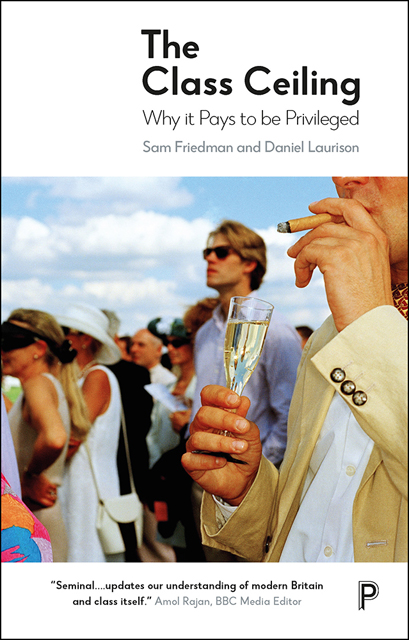Book contents
- Frontmatter
- Dedication
- Miscellaneous Frontmatter
- Contents
- List of figures and tables
- Acknowledgements
- Note on language usage
- Introduction
- one Getting in
- two Getting on
- three Untangling the class pay gap
- four Inside elite firms
- five The Bank of Mum and Dad
- six A helping hand
- seven Fitting in
- eight View from the top
- nine Self-elimination
- ten Class ceilings: A new approach to social mobility
- eleven Conclusion
- Epilogue: 10 ways to break the class ceiling
- Methodological appendix
- Notes
- References
- Index
one - Getting in
Published online by Cambridge University Press: 14 April 2023
- Frontmatter
- Dedication
- Miscellaneous Frontmatter
- Contents
- List of figures and tables
- Acknowledgements
- Note on language usage
- Introduction
- one Getting in
- two Getting on
- three Untangling the class pay gap
- four Inside elite firms
- five The Bank of Mum and Dad
- six A helping hand
- seven Fitting in
- eight View from the top
- nine Self-elimination
- ten Class ceilings: A new approach to social mobility
- eleven Conclusion
- Epilogue: 10 ways to break the class ceiling
- Methodological appendix
- Notes
- References
- Index
Summary
Social mobility has become one of the central political issues of our times; certainly across the Western world, it has emerged as the rhetorical weapon of choice for a generation of political leaders. Impassioned speeches abound. “The American Dream is dead,” Donald Trump declared throughout his 2016 presidential campaign, “But I will bring it back.” In France, Emmanuel Macron has made similar promises. It is in the UK, however, that mobility is most explicitly centre-stage. As Theresa May proclaimed in her maiden speech as Prime Minister: “We won’t entrench the advantages of the fortunate few; we will do everything we can to help anybody, whatever your background, to go as far as your talents will take you.”
The bellwether for how nations are doing on social mobility, as we explained in the Introduction, is very often access to the top – who gets into elite occupations and how this relates to their class background. This is perhaps partly due to the limited slice of society that politicians tend to see in their everyday lives. But it also reflects the way in which elite careers are routinely held up by politicians as what we should all be striving towards – occupational destinations that offer high incomes, high status and considerable decision-making power. Such political narratives are fairly obviously undermined, however, if such highly prized arenas are seen as inaccessible, or rigged in favour of the privileged.
But there has long been a perception that many high-status occupations in the UK, such as law, medicine and journalism, are exactly that: professions that have traditionally been, and remain today, stubbornly elitist. As Alan Milburn wrote before resigning in protest as Chair of the UK Social Mobility Commission (SMC), ‘the most pressing policy priority facing the country is opening up the top of British society.’ Britain, he argued, ‘remains – at heart – elitist.’
Yet despite the impassioned political rhetoric surrounding ‘fair access’, the truth is that our actual understanding of this issue has long lagged behind. This is because the surveys traditionally used to look at social mobility have at most a few thousand respondents. That is more than enough for capturing the overall relationship between origins and destinations in terms of ‘big social classes’.
- Type
- Chapter
- Information
- The Class CeilingWhy It Pays to Be Privileged, pp. 29 - 44Publisher: Bristol University PressPrint publication year: 2019

